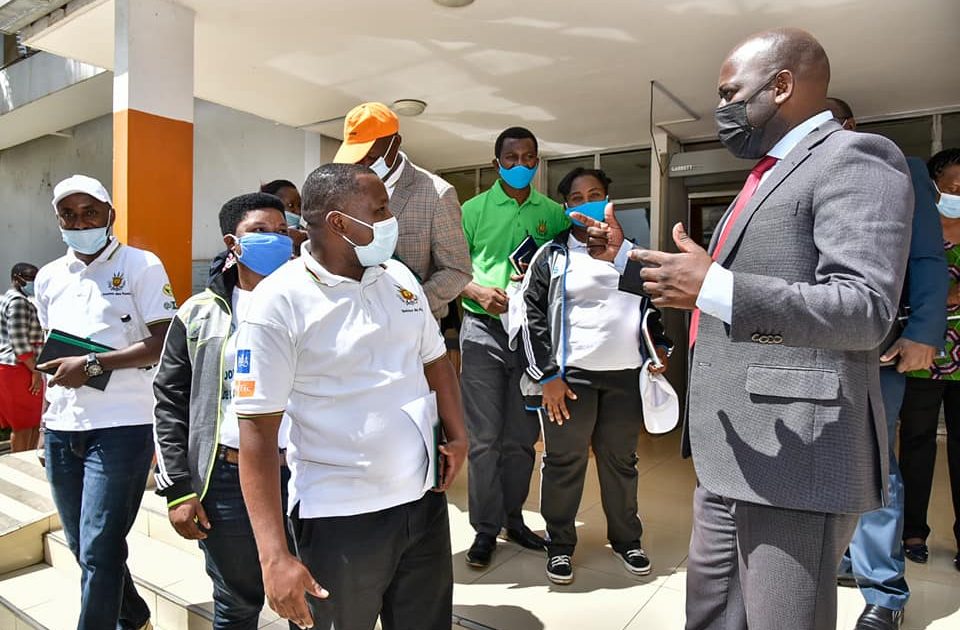Nakuru Deputy Governor Dr Eric Korir has expressed concern that increased global movement of goods and services coupled with changing climatic conditions has exposed Kenyan farmers to unexpected challenges including new diseases and pests.
Dr Korir said emerging pests and new diseases besides spelling disaster to Kenyan farmers were a threat to food security.
Speaking in his office when he met a delegation from the Institute of Agricultural Sciences of Burundi (IASB), Dr Korir indicated that in some areas, post-harvest losses attributed to these pests and diseases have ranged from 70 percent to 100 percent.
“To address new challenges posed by these pests and diseases, the county administration put up 45 plant clinics spread out in all the 11 sub-counties through partnership with Ministry of Agriculture, Livestock and Fisheries and other state agencies.
The menace has globalized to alarming proportions afflicting at least 41 percent of food crops worldwide,” Dr Korir stated.
The 43-man delegation was led by Director General to the Institute of Agricultural Sciences of Burundi Dr Alfred Niyokwishimira.
“Just like in your usual human clinic, farmers take their infected, infested and affected crops to plant clinics in designated areas where experts (plant doctors) diagnose pests and diseases and advise them accordingly.
The experts employ direct observation of the diseased or infested plant sample and advise farmers accordingly on remedial or future preventive actions to be undertaken on their farms,” explained Dr Korir.
The Deputy Governor observed that wrong diagnostics of emerging plant diseases and pests have led to resistance of the pestilences to agrochemicals.
“Most of our farmers have been rushing to agro vets and buying disease and pest control chemicals that are not necessarily effective for their problems. When we receive specimen at the plant clinics, we conduct in depth analysis to establish the exact disease or pest that has afflicted the plant before advising on proper management and preventive procedures,” stated Dr Korir.
In the County, the Deputy Governor singled out Maize Lethal Necrosis as the most devastating plant disease which was first detected in Bomet County in 2011, and tomato blight disease which afflicts tomatoes, beans and potatoes, the deadly Ug99 strain of stem rust known for causing massive wheat losses and Downy mildew which strikes vegetables.
“At plant clinics, we advise farmers on preventive rather than curative measures when dealing with new invasive plant diseases and pests. We have in the recent past witnessed the emergence of new species of aphids which are very destructive to food crops.
Farmers are grappling with Tuta absoluta caterpillars (commonly known as leaf miner) which until 1968 were confined to South Africa but have now spread to most parts of the world including Nakuru,” explained Dr Korir.
Dr Niyokwishimira warned that with poorly enforced quarantine between borders, farmers will continue to witness new disease strains and pest species whose effective management can only be guaranteed by specimen analysis at plant clinics.
He observed that plant clinics were crucial in filling in gaps left by shortage of extension officers.
“Experts in this East African region should be alive to realities of climate change which necessitates continuous training of plant doctors on new trends in crop disease and pest control,” noted the Director General.
Dr Niyokwishimira added “With properly functioning plant clinics such diseases can be detected early and managed before they spread. In developed societies, plant clinics have been used for early pest and disease detection and management. The same concept should be extended to animals,”
The County Executive Committee Member for Agriculture, Dr Immaculate Maina, stated that her department is working with experts and donor agencies to develop a mobile phone application that will enable farmers to connect with plant doctors when they cannot access the clinics.
“We are developing a mobile app to enable farmers to get real time diagnostic information on pests and diseases at his or her farm. The farmer will be able to send electronic images of afflicted crops and receive instant and expert opinion from plant clinics” assured the CEC.
Dr Maina asserted that the County Administration has already purchased and installed equipment in all the plant clinics across the 11 sub-counties for plant diagnostics and pest management systems.
“Our collaboration with the National Government, universities and research organizations, ensures that we have a pool of trainers who can disseminate their knowledge to hundreds of experts all over the county,” the CEC pointed out.
She indicated that all data collected at the plant clinics is analyzed and archived on the internet. The intention is for such data to become a future reference point for further studies.
A vegetable farmer in Bahati Sub-County, John Stanley Thiru, stated that smallholder growers in the region attending plant clinics were now practicing crop rotation, checking for plant health problems on a regular basis, removing weeds, and infested or damaged material.
“There has been a paradigm shift thanks to plant clinics in these areas as farmers are now less likely to use pesticides and more likely to avoid chemical drift if they do use pesticides. They have seriously adopted the use of protective gear – such as gumboots, caps or overcoats – and are more likely to wash themselves and the equipment used after pesticide applications.
This confirms that the plant clinics framework is an impactful and cost-effective approach to improving a national plant health system. Not only do they make smallholder farmers more food secure with safer practices, but also result in improved crop-based household incomes,” said Thiru.
Through plant clinics, Thiru observed that farmers have learnt how to manage diseases and pests that have developed resistance to agro chemicals.
“We no longer spray pests or infested crops without consulting experts at plant clinics. Due to the right diagnosis, we have saved millions on disease and pest control,” the farmer said.
By Anne Mwale and David Opingo





